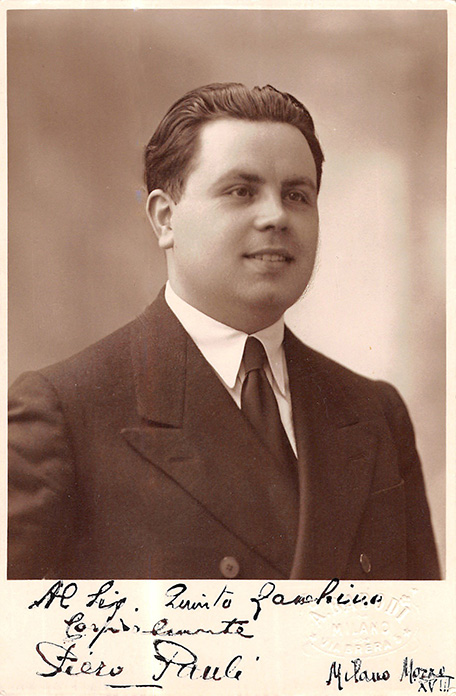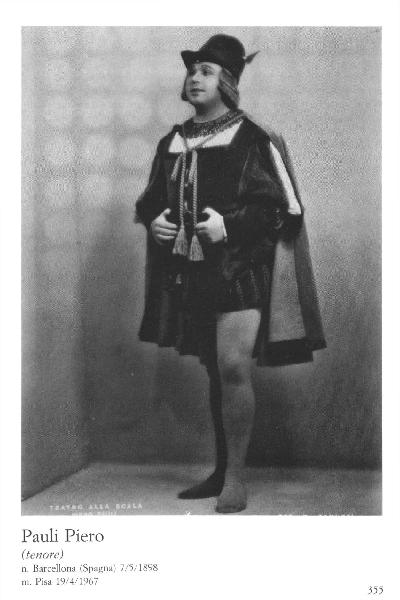Discography
Gramophone, Milano, 7 November 1929
CM1213-II Tosca (Puccini): Non la sospiri (w. Melis) S 10143, AN 684, AF 338, C 1903, EH 537
Gramophone, Milano, 11 November 1929
CM1219-I Tosca (Puccini): Senti, l'ora è vicina (w. Melis) S 10154, AN 695, AF 349, C 1914, EH 548
Gramophone, Milano, 12 November 1929
CM1222-II Tosca (Puccini): Recondita armonia (w. Gelli) S 10142, AN 683, AF 337, C 1902, EH 536
Gramophone, Milano, 14 November 1929
CM1224-III Tosca (Puccini): E lucevan le stelle (w. Weinberg) S 10153, AN 694, AF 348, C 1913, EH 547
CM1227-I Tosca (Puccini): Ah! Franchigia a Floria Tosca (w. Melis) S 10154, AN 695, AF 349, C 1914, EH 548
Gramophone, Milano, 15 November 1929
CM1229-II Tosca (Puccini): Eccellenza, vado (w. Gelli, Azzimonti & Melis) S 10143, AN 684, AF 338, C 1903, EH 537
CM1230-II Tosca (Puccini): Il cannon del castello S 10145, AN 686, AF 340, C 1905, EH 539
(w. Azzimonti, Gelli, Granforte & Palai)
Gramophone, Milano, 18 November 1929
CM1232-II Tosca (Puccini): Va! Quanto m'affretti (w. Melis & Azzimonti) S 10144, AN 685, AF 339, C 1904, EH 538
Gramophone, Milano, 20 November 1929
CM1240-I Tosca (Puccini): Ed or fra noi parliam S 10149, AN 690, AF 344, C 1909, EH 543
(w. Melis, Granforte & Azzimonti)
CM1241-II Tosca (Puccini): Or su, Tosca, parlate S 10149, AN 690, AF 344, C 1909, EH 543
(w. Granforte, Melis, Azzimonti & Palai)
CM1242-II Tosca (Puccini): Vittoria! (w. Melis, Granforte & Azzimonti) S 10150, AN 691, AF 345, C 1910, EH 544
Gramophone, Milano, 21 November 1929
CM1244-II Tosca (Puccini): Ah! finalmente (w. Azzimonti & Gelli) S 10142, AN 683, AF 337, C 1902, EH 536
Gramophone, Milano, 22 November 1929
CM1249-I Tosca (Puccini): Egli è là (w. Granforte, Palai & Melis) S 10148, AN 689, AF 343, C 1908, EH 542
Gramophone, Milano, 14 January 1930
CM1216-III Tosca (Puccini): Qual occhio al mondo (w. Melis) S 10144, AN 685, AF 339, C 1904, EH 538
CM1221-IV Tosca (Puccini): E non giungono (w. Melis) S 10155, AN 696, AF 350, C 1915, EH 549
Gramophone, Milano, 16 April 1930
BM1581-I Bohème (Puccini): Quest'è Mimì (w. Palai, Gu. Masini & Basi) DA 1204
Gramophone, Milano, 24 April 1930
CM1590-II Mefistofele (Boito): Forma ideal purissima DB 1440
(w. Fanelli & Gu. Masini)
CM1591-I Mefistofele (Boito): Amore, mistero (w. Fanelli) DB 1440
Gramophone, Milano, 7 May 1930
CM1592-II Falstaff (Verdi): Dal labbro il canto DB 1648
Gramophone, Milano, 21 January 1931
0F29-II Mefistofele (Boito): Giunto sul passo estremo DA 1202
0F30-II Mefistofele (Boito): Dai campi, dai prati DA 1202
Gramophone, Milano, 23 January 1931
OF34-II Gianni Schicchi (Puccini): Firenze è come un albero fiorito DA 1204
OF35-II Bohème (Leoncavallo): Testa adorata DA 1204
Gramophone, Milano, 23 April 1931
2F269-II Carmen (Bizet): La tua madre con me (w. Carbone) S 10304, C 2314, EH 745
2F270-II Carmen (Bizet): Con la guardia quando monta (w. Bordonali) S 10301, C 2311, EH 742
2F271-II Carmen (Bizet): Resta qui, mio tesor (w. Carbone) S 10304, C 2314, EH 745
2F273-III Carmen (Bizet): Ma non m'inganno (w. G. Besanzoni & Carbone) S 10315, C 2325, EH 756
Gramophone, Milano, 27 April 1931
2F293-I Carmen (Bizet): Ebben, là che servan (w. Spada) S 10302, C 2312, EH 743
2F294-II Carmen (Bizet): Carmen, tutti quì (w. Carbone) S 10303, C 2313, EH 744
Gramophone, Milano, 7 May 1931
2F320-II Carmen (Bizet): Olà! Olà! José! S 10315, C 2325, EH 756
(w. G. Besanzoni, Carbone, E. Besanzoni, Venturini & Palai)
2F321-II Carmen (Bizet): Va via S 10316, C 2326, EH 757
(w. G. Besanzoni, Carbone, Ferrari, Beltacchi, E. Besanzoni, Venturini & Palai)
Gramophone, Milano, 11 May 1931
2F338-II Carmen (Bizet): Ascolta, camerata S 10312, C 2322, EH 753
(w. G. Besanzoni, Ferrari, Beltacchi, Venturini & Palai)
Gramophone, Milano, 14 May 1931
2F359-II Carmen (Bizet): Olà, Carmen! Olà S 10311, C 2321, EH 752
(w. G. Besanzoni, Ferrari, Beltacchi, Spada, Venturini & Palai)
Gramophone, Milano, 15 May 1931
2F360-IV Carmen (Bizet): Sei tu? Son io!, pt. 2 (w. G. Besanzoni) S 10318, C 2328, EH 759
2F368-II Carmen (Bizet): Sei tu? Son io!, pt. 1 (w. G. Besanzoni) S 10318, C 2328, EH 759
Gramophone, Milano, 18 May 1931
2F375-II Carmen (Bizet): Mio capitan (w. Spada & G. Besanzoni) S 10305, C 2315, EH 746
2F377-I Carmen (Bizet): Ci riposiam (w. G. Besanzoni & Palai) S 10312, C 2322, EH 753
2F378-II Carmen (Bizet): E chi puoi tu aspettar? S 10309, C 2319, EH 750
(w. G. Besanzoni, Venturini & Palai)
Gramophone, Milano, 21 May 1931
2F379-IV Carmen (Bizet): Voglio danzar (w. G. Besanzoni) S 10309, C 2319, EH 750
2F382-II Carmen (Bizet): No, tu non m'ami (w. G. Besanzoni) S 10310, C 2320, EH 751
Gramophone, Milano, 22 May 1931
2F380-IV Carmen (Bizet): Presso il bastion di Siviglia (w. G. Besanzoni) S 10305, C 2315, EH 746
Gramophone, Milano, 6 July 1931
2F260-VI Carmen (Bizet): Il fior che avevi a me tu dato S 10310, C 2320, C 7176, EH 751
Gramophone, Milano, December 1931
2M208-II Faust (Gounod): Io voglio il piacer, pt. 1 (w. Zambelli) DB 1637, Victor 11408
2M209-II Faust (Gounod): Io voglio il piacer, pt. 2 (w. Zambelli) DB 1637, Victor 11408
2M211-I Manon (Massenet): A Parigi n'andrem (w. Saraceni) DB 1648
2M214 L'arlesiana (Cilea): È la solita storia DB 2013
Gramophone, Milano, 21 March 1933
2M1208-II Bohème (Puccini): O soave fanciulla (w. Tassinari) DB 1932
Gramophone, Milano, 8 April 1933
0M1253-II Faust (Gounod): Tardi si fa (w. Tassinari) DA 1322
0M1254-II Faust (Gounod): Sempre amar (w. Tassinari) DA 1322
Gramophone, Milano, 20 April 1933
0M1297-II Occhi di fata (Denza) DA 1321
0M1298-II Aprile (Tosti) DA 1321
Gramophone, Milano, 25 April 1933
2M1301-II Ninna nanna (= Wiegenlied op. 41/1) (R. Strauss) DB 2012
Gramophone, Milano, 3 June 1933
0M1341-II Walküre (Wagner): Cede il verno DA 1331
0M1342-I Germania (Franchetti): Studenti, udite DA 1332
Gramophone, Milano, 4 June 1933
0M1343-II Fedora (Giordano): Mia madre (w. Oltrabella) DA 1340
0M1345-II Germania (Franchetti): No, non chiuder gli occhi vaghi DA 1332
Gramophone, Milano, 18 June 1933
2M1411-II Adriana Lecouvreur (Cilea): No, la mia fronte (w. Saraceni) DB 2012
2M1412-I Manon (Massenet): La tua non è la mano (w. Saraceni) DB 2013
Gramophone, Milano, December 1934
0BA308-II Disco belliniano, pt. 1 (w. Allulli Olivieri & Costa) HN 736
(Pauli sings Norma: Meco all'altar/Qual cor tradisti)
|

